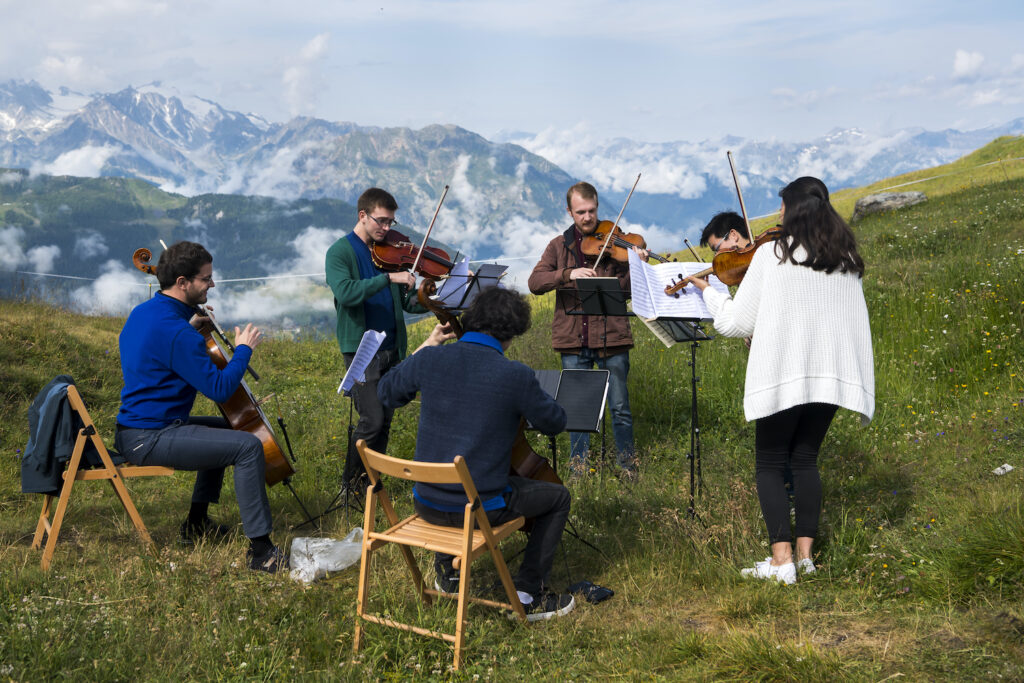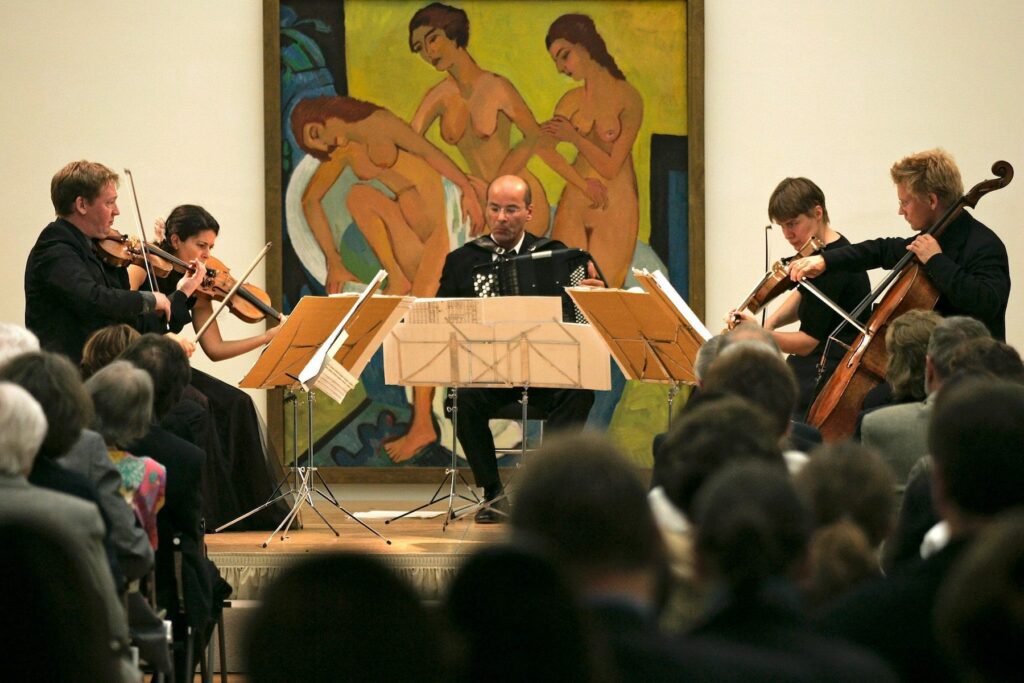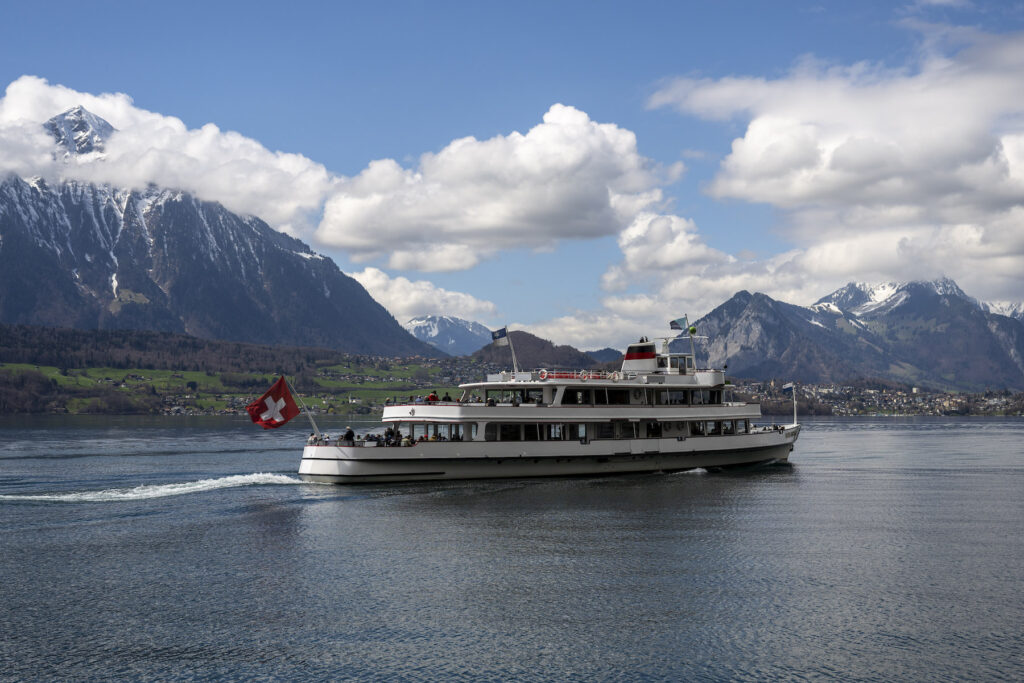lun, Avr 17th 2023

Did you know that Switzerland is a key port of call for the crème de la crème of the world’s singers, solo instrumentalists, orchestras, and conductors? Top artists regularly appear in this country’s major opera houses and concert halls during the traditional September to July season – but that doesn’t mean the warmer months are shrouded in silence.
Classical music enthusiasts can continue to enjoy world-class performances throughout the summer at the plethora of festivals staged all over the country. Indeed, Switzerland has an exceptionally high concentration of classical music festivals, each with its own special character, and often with a highly innovative concept. So prized are these events that several of the most outstanding performers of our time can be heard at more than one festival during the same season.
The Lucerne Festival was launched in 1938 as an alternative to the Salzburg Festival – due to the ominous political situation in 1930s Europe – with an opening concert conducted by the great Arturo Toscanini. To this day, it remains a point of reference on the international musical calendar, staging approximately 100 events that include symphony concerts, chamber music, recitals, débuts, and late-night performances.
This year’s Summer Festival theme is “Paradise” – a counterpoint to our present-day political tensions and conflicts – and the program will feature some of the world’s greatest soloists, such as pianists Martha Argerich and Jean-Yves Thibaudet, violinists Anne-Sophie Mutter and Christian Tetzlaff as well as orchestral ensembles ranging from the Vienna Philharmonic to the Boston Symphony Orchestra. Add to this the dramatic backdrop of Lake Lucerne and Jean Nouvel’s stunning KKL concert hall, and you’ll be in musical heaven.

Verbier in the Valais is of course known as a fashionable ski resort, but also has a globally renowned music festival launched in 1994 with the mission of building a community of exchange between great masters and young artists from all over the world. The Verbier Festival Academy discovers and nurtures future talents: each summer, audiences witness these musicians in action at more than 100 masterclasses, rehearsals, and performances, while the Verbier Festival Orchestra has become a rite of passage for today’s exceptional young orchestral musicians.
Highlights this summer will include Yuja Wang performing Rachmaninoff’s Third Piano Concerto with the Verbier Festival Orchestra under Zubin Mehta, a song recital given in the Church of Verbier by the wonderful soprano Véronique Gens – a personal favorite of this writer – and a solo piano program performed by the brilliant Evgeny Kissin.
Another Valais destination is the Zermatt Music Festival & Academy, which was launched in 2006. In early September, young musicians, who are taught at the Academy by distinguished players from the Berlin Philharmonic, study and perform in the churches, chalets, and hotels of this most picturesque of alpine villages, creating a relaxed atmosphere in which young artists, inspiring teachers and international headliners all participate in a joyful musical program.
One highlight of this year’s festival is sure to be the poetic young pianist Teo Gheorghiu’s début in Zermatt. A début with a twist: Teo will be performing high above Zermatt in the enchanting little Riffelalp Chapel. “It’s a thrilling prospect to be giving my first Zermatt Festival performance on the Riffelalp – I love climbing mountains on foot or by bike, so playing an intensely personal program at 2,222 meters above sea level is the perfect fit,” says the young athlete, who also loves playing soccer. The Swiss-Canadian of Romanian origin will be playing his latest album, ROOTS.
“This is a solo piano journey to explore my personal and musical heritage,” he explains. “The program will feature Romanian music by Enescu and Bartók as well as Modest Mussorgsky’s ‘Pictures at an Exhibition.’” It should be well worth the trek.

Between July and September, yet another chic winter resort, Gstaad in the Bernese Oberland, becomes a musical Mecca. Founded in 1957 by the great violinist Yehudi Menuhin, the Gstaad Menuhin Festival & Academy is a première destination for some of the world’s finest artists.
The Gstaad Festival Orchestra is an internationally acclaimed ensemble, while the Gstaad Academy offers classes in the disciplines of conducting, piano, singing, string playing and baroque music. Every year, the festival also premières a new work.
Under the motto of “Humility,” this year’s program will include a “Barocchissimo” orchestral concert featuring the delightfully ebullient mezzo soprano Cecilia Bartoli, Schubert’s “Winterreise” song cycle performed by the velvety-voiced baritone Matthias Goerne, with Maria João Pires at the piano, “Marlene” – the seductive Ute Lemper’s rendezvous with Marlene Dietrich – and “Dance on Ice,” a children’s and family concert: there will be something for everyone!

The same can be said of the Davos Festival, which offers a unique platform for especially talented young musicians on the cusp of promising careers. Offering varied performance venues and direct encounters between artists and audiences, the festival concept always includes Davos’s history and magnificent natural setting.
Thought-provoking themes are closely linked to current events. This year’s theme is “Alone.” Marco Amherd, the festival’s dynamic young director, himself a sought-after organist, conductor, and choral director, explains:
After more than two years of the pandemic, being alone, both as a condition and as a topic of debate, has become a more explosive issue. But ‘Alone’ also touches on Davos’s history – exile, mental and physical illnesses, and loneliness are juxtaposed with productive seclusion, emancipation, and self-love.
Marco Amherd
What can festival-goers look forward to? The varied musical events, some combined with outdoor activities, will include a festival walk, Wege zum Glück (Paths to Happiness): short concerts will be given at numerous locations, giving audiences food for thought before embarking on the next stage of the route. Focusing on transience and closeness to nature, the Waldeinsamkeit (Sylvan Solitude) concert will begin at Davos’s well-known forest cemetery.
After a short, guided walk, the event will conclude at the crematorium with Benjamin Britten’s Lachrymae performed by Saò Soulez Larivière. And at the festival brunch in Unterrauchen there will be music for saxophone quartet, woodwind quintet and harp to discover – against the magnificent backdrop of Lake Schwarzsee.

Another ravishingly beautiful body of water – Lake Thun in the Bernese Oberland – provides the setting for yet another young and dynamic festival, the Bachwochen Thun. As its director, Swiss harpsichordist Vital Julian Frey, explains, the festival focuses on the work of Johann Sebastian Bach, but also promotes the great composer as a source of inspiration in general.
“Cross-disciplinary projects connect Bach’s music to the present and encourage us to explore our environment artistically,” Frey says.
This year’s festival will open with Vital at the harpsichord together with the Camerata Bern, performing a concerto composed especially for him by Bruno Leuschner.
“It’s an exciting work, a stylistic chameleon, featuring a jazz-inspired interpretation of Bach’s well-known ‘Badinerie,’” Frey says. “Juxtaposed with this is a true rarity that not even many Bach connoisseurs will know – the early, A minor version of Bach’s well-known B minor Suite, with a concertante violin instead of a flute.”
With many highlights in between, the festival will conclude with a program featuring vocal works by Bach’s sons – Carl Philipp Emanuel Bach’s splendid “Magnificat” and Johann Christian Bach’s “Gloria ” – performed by the Swiss Youth Choir.
This is just a small selection of the musical delights on offer throughout the summer. Whether you’re in evening dress at a concert hall, walking in a forest or hiking up a mountain – this classical festival season is sure to appeal to all tastes.

Cet article peut être librement partagé et réimprimé, à condition qu'il renvoie clairement à l'article original.
